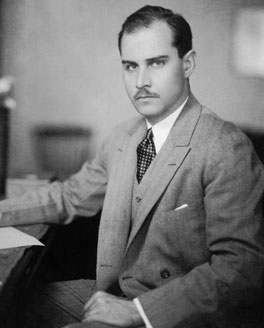Briton Hadden
 | ||||||||||||||
| Born | 18 February 1898 | |||||||||||||
| Died | 27 February 1929 (Age 31) | |||||||||||||
| Alma mater | Hotchkiss School, Yale | |||||||||||||
| Member of | Skull and Bones | |||||||||||||
Co-founder of Time Magazine with Henry Luce, who gained hold of company after Hadden died prematurely in 1928.
| ||||||||||||||
Briton Hadden was the co-founder of Time magazine with his Yale classmate Henry Luce. He was Time 's first editor and the inventor of its revolutionary writing style, known as Timestyle. Though he died at 31, he was considered one of the most influential journalists of the twenties, a master innovator and stylist, and an iconic figure of the Jazz Age.
Founding of Time magazine
In 1923, Hadden and Luce co-founded Time magazine along with Robert Livingston Johnson and another Yale classmate. Hadden and Luce served alternating years as the company's president, but Hadden was the editor for four and a half of the magazine's first six years, and was considered the "presiding genius".
Death
Wikipedia reports that "In December 1928, Hadden became ill. He died two months later, most likely of streptococcus viridans, which had entered his bloodstream, causing septicemia and ultimately the failure of his heart. Before he died, Hadden signed a will, which left all of his stock in Time Inc. to his mother and forbade his family from selling those shares for 49 years. Within a year of Hadden's death, Luce formed a syndicate, which succeeded in gaining hold of Hadden's stock."
Luce took Hadden's name off the masthead of Time within two weeks of his death. In the next 38 years, he delivered more than 300 speeches around the world, mentioning Hadden four times. Luce acquired control of Hadden's papers, and he kept them at Time Inc., where no one outside the company was allowed to view the papers as long as Luce lived. Throughout his life, Luce repeatedly claimed credit for Hadden's ideas in public speeches and in Time magazine.[1]